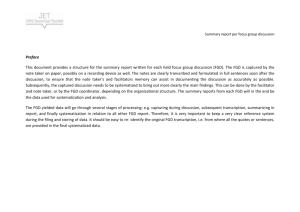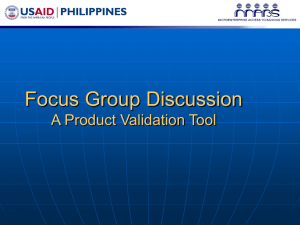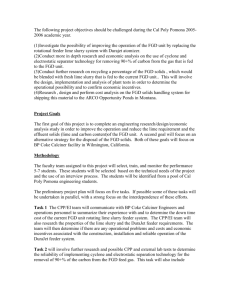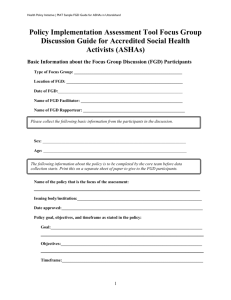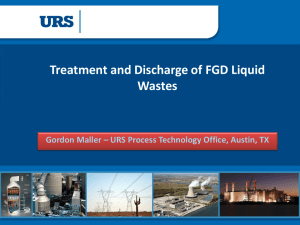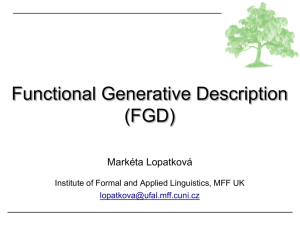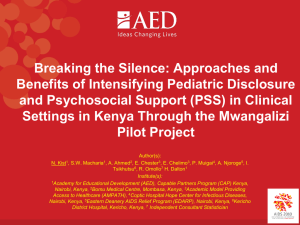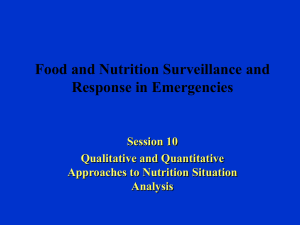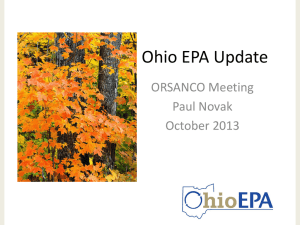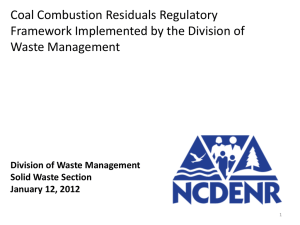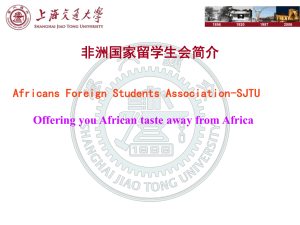iNTRO2 - paase
advertisement
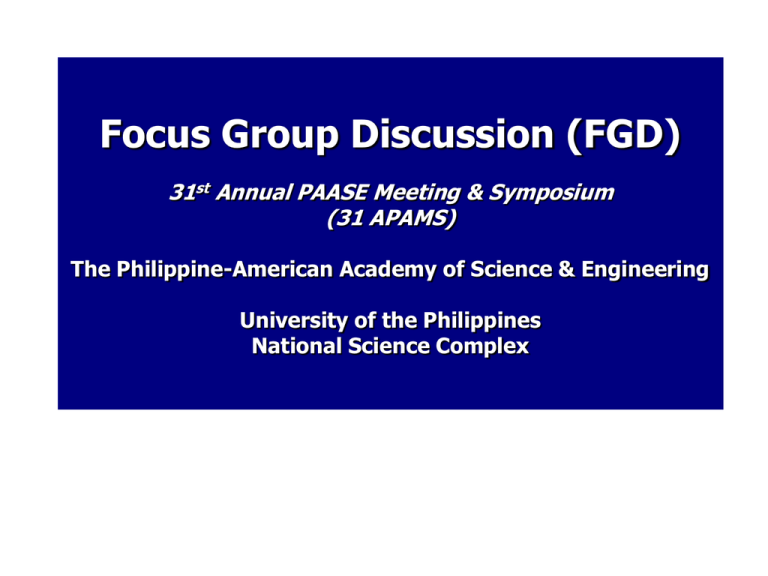
Focus Group Discussion (FGD) 31st Annual PAASE Meeting & Symposium (31 APAMS) The Philippine-American Academy of Science & Engineering University of the Philippines National Science Complex Why FGDs? • FGD is an important forum to engage our colleagues and participants to discuss issues, but more importantly come up with actionable solutions enabling advances in science and technology in the Philippines. • A practical aspect of which is to improve our institutions, economy, mitigate threats, and capitalize on new developments, thereby improving the lives of the Filipino. • This can be a basis by which PAASE advocates and coordinates on specific relevant topics to the government, industry, and academia. We simply want to make a difference and not just talk! • We want to come up with real action items and recommendations will endup with an important “PAASE Report” and Proceedings that will be published. FGDs • FGD 1: Initiatives to Increase R&D funding and innovation • FGD 2: Government Legislation, and S&T Development • FGD 3: Science and Engineering Curriculum Review : Ph.D. Training, Exchange programs and Balik Scientist program • FGD 4: Internal and External Review • FGD 5: Environmental and Disaster Management • FGD 6: Secondary Education: Curriculum Review in Science and Engineering from K-12 • FGD 7: Energy and Sustainability • FGD 8: Millenium Development Goals FGD Core Group • FGD 1: Initiatives to increase R&D funding – Denny Roja – (denny@valuquestinc.com) Jun Lao Art Tan - arthur.tan@ph.global-imi.com Phil Dev. Organization - garchitorena.vp@ayala.com.ph Paco Sandejas - paco@narravc.com Maoi Arroyo • FGD 2: Government Legislation, and S&T Development – Greg Tangonan – ( tangonan@gmail.com) Luis Villafuerte - lrvcongress@yahoo.com Mario Montejo - mgmontejo@dost.gov.ph Joseph Emilio Abaya FGD Core Group • FGD 3:Science and Engineering Curriculum Review includes Ph.D. Training, Exchange programs and Balik Scientist program Rigoberto Advincula – (radvincula@uh.edu) Carlito Lebrilla - cblebrilla@ucdavis.edu Ed Mendoza - mendoza@lmu.de Tina Binag - cabinag@yahoo.com Maribel Nonato - pandans2001@yahoo.com Alvin Culaba - culaba_alvin@yahoo.com Giselle Concepcion - gpconcepcion@gmail.com • FGD 4: Internal and external review Pedro Jose – (PJose@cnmc.org) Mel Gomez - rdgomez@umd.edu Helen Yap (MSI) - helentyap@yahoo.com Leah Tolosa - leah@umbc.edu Arnel Salvador (Physics) - asalvador.nip@gmail.com Amy Guevarra - amypguevara@gmail.com FGD Core Group • FGD 5: Environmental and Disaster Management Josefino C. Comiso (josefino.c.comiso@nasa.gov) Felino Lansigan fplansigan@yahoo.com Willy Padolina willy@padolina.net Rodel Lasco rdlasco@yahoo.com Mahar Lagmay mlagmay@nigs.upd.edu.ph Michelle Almendrala michael.almendrala@yahoo.com FGD 6: Secondary Education: Curriculum Review in Science and Engineering from K-12 Lourdes (Lulu) Herold,(lherold526@aol.com) Al Albano, alfonso.albano@gmail.com Olie Lucas, olie.lucas@gmail.com Sevilla Detera-Wadleigh, Sevilladetera@gmail.com Teofilo (Ditos) Gonzales III, multo2000@yahoo.com Raquel Huliganga, raquelhuliganga@yahoo.com FGD Core Group • FGD 7: Energy and Sustainability Toby Dayrit, (toby_dayrit@yahoo.com) Tetchie Capellan Miguel Escoto Manuel Biona Catalina Blanche • FGD 8: Millenium Development Goals Ernie Pernia (edmpernia@econ.upd.edu.ph) Rosario G. Manasan Erlinda Capones Jackson Ubias Mel Bacabac Specifics • - FGD: Initiatives to increase R&D funding – This includes private-public partnerships in R&D, PEZA style incentives for R&D operations, potential for Knowledge-based BPO industries, liason with legislation: Describe models in Taiwan, Korea, Vietnam for incentives. Improving R&D investment climate. Emphasize importance for export oriented economy Need for more intellectual property protection Analogous to Physical infrastructure, we need intellectual infrastructure to improve our economy. Private investments: large corporations and start-up companies Specifics • FGD: Government Legislation, and S&T Development – Legislation, - Effective legislation to provide incentives for investments. National funding for private-public partnerships Legislate tax incentives or research institutes. Revise the procurement laws IP protection in global economy Balance with environmental legislation How to enable an investment climate. Mandates for R&D curriculum in universities National Science Complex II, PPP in Science and Engineering, Procurement Law, IP issues and Drug Development. Specifics • - - FGD: Science and Engineering (specific discipline) Curriculum Review – Ph.D. training, Exchange program, preparedness for research and translation/extension/technology transfer: Accelerated M.S. and Ph.D. training and incentives Sandwich programs. Example of formal linkage agreements with UH, NYU Balik Scientist Program, National Science Complex. Science and engineering Chemical curriculum review, to be more interdisciplinary. Priorities for faculty development Specifics • - FGD:Internal and external review – Mechanisms and methods to get the best proposals funded. The importance of PAASE in the review process. Importance of external review. Mechanisms for the review process: NSF or NIH style. Getting the best proposals funded. Methods of seed grants in Universities DOST, ERDT, PCASTRD, PCHED, how to be more efficient. Collaborative proposals and priorities for junior faculty Specifics • - FGD: Environmental and Disaster Mitigation – Natural or man-made disasters, threats and opportunities to Philippine economy, new technologies for monitoring, Truth vs. hype. Unique geo and climate characteristics of the Philippines Disaster preparedness Balance between economic needs and climate legislation Education of the population on recycling and waste management Specifics • - FGD: Secondary Education: Curriculum Review in Science and Engineering from K-12 Education emphasis on science and engineering curriculum very early. Career and incentives for higher education. Upgrade facilities and faculty in science education Direct connection between K-12 and Universities through summer internships. Private foundation role in education Specifics • - FGD : Energy and Sustainability Energy demand and cost. Renewable energy sources. Unique Philippine renewable sources: Geothermal and wind Solar energy. Private and government investments Specifics • - - FGD : Millenium Development Goals Millennium Development Goals (MDGs) set by the United Nations – These are: (i) poverty, hunger, and unemployment; (ii) universal primary education; (iii) gender equality and women empowerment; (iv) child mortality; (v) maternal health; (vi) HIV/AIDS, malaria, and other diseases; (vii) environmental sustainability; and (viii) global partnership for development. To examine the country’s chances of achieving the objectives. Responsible Parenthood and Reproductive Health bill (RP/RH bill). Specifics • FGD Sessions Breakout (2:00-5:00 PM) • FGD breakout sessions (10 minutes – introductions and assignment of subtopics - 80 minutes for discussions) – 2 hour discussion of FGD core with participants, then 30 minutes wrap-up • - Presentations: Summary of FGDs (on Friday, June 17) 5 minute Summary Presentation on stage for each FGD Open Forum: Write your questions – reserved General open forum and discussions. We want solutions!
